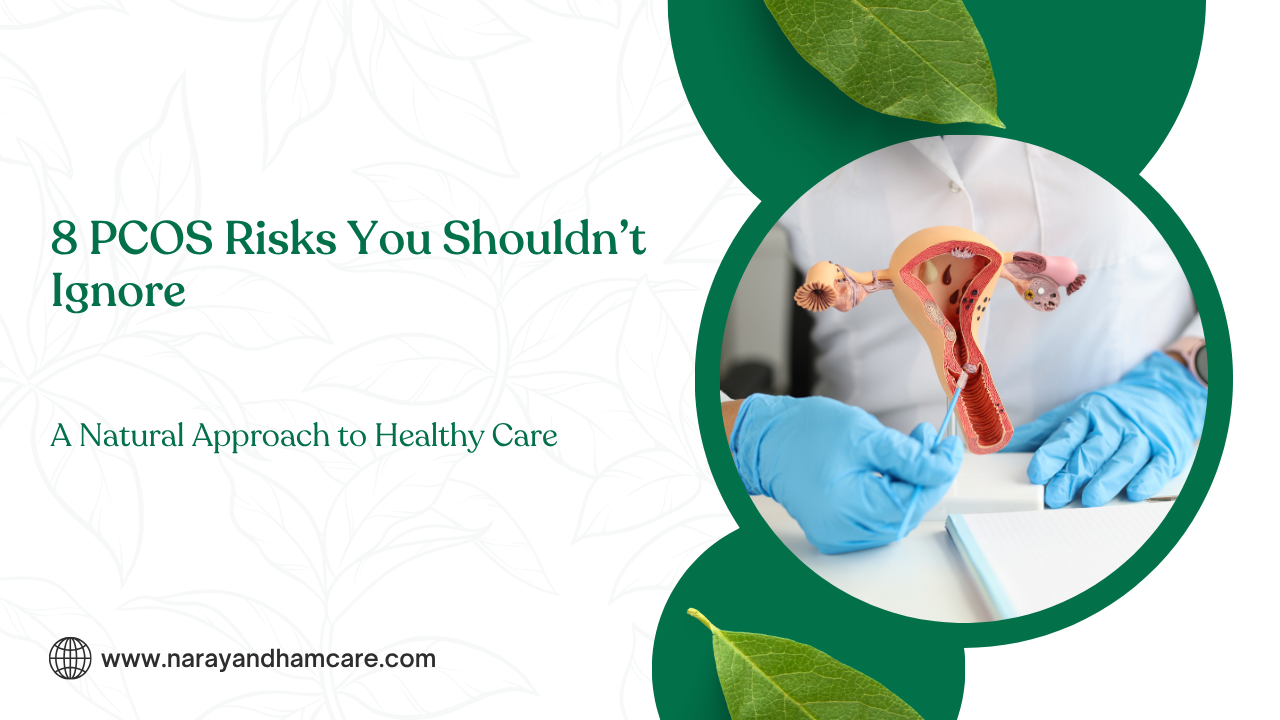🔹 Introduction: Why You Must Understand PCOS Risks
PCOS (Polycystic Ovary Syndrome) is a hormonal disorder that affects millions of women around the world. Many women don’t even know they have it until they face symptoms like irregular periods, weight gain, acne, or difficulty in getting pregnant.
Understanding the risks of PCOS is very important. Ignoring the symptoms can lead to long-term health issues like infertility, diabetes, and heart problems. This blog will explain the top 3 PCOS risks you know and follow diet tips, and how to manage them with natural remedies, diet tips, and healthy lifestyle changes.
🔹 Problem: What Happens If PCOS Is Left Untreated?
it is more than just missed periods or unwanted hair growth. It affects your whole body – especially your hormonal system. it can disturb your insulin levels, increase male hormones (androgens), and lead to a variety of physical and emotional health problems.
This condition mainly affects women of reproductive age (15–45 years), but even teenagers and young adults are showing signs of hormonal imbalance these days due to stress, unhealthy food, and a sedentary lifestyle.
🔹 Symptoms of PCOS You Should Notice
If you have any of these symptoms, it’s time to talk to a doctor and consider testing:
- Irregular or missed periods
- Excess facial or body hair (hirsutism)
- Acne or oily skin
- Thinning hair or hair loss from the scalp
- Weight gain, especially around the belly
- Difficulty getting pregnant (infertility)
- Dark patches on the skin (neck, underarms)
- Mood swings, depression, or anxiety
🔹 8 Major PCOS Risks You Shouldn’t Ignore
Let’s explore the top 8 health risks associated:
1. Infertility and Irregular Ovulation
One of the most well-known effects is difficulty in getting pregnant. Irregular or absent ovulation means your body doesn’t release eggs regularly, making conception difficult.
What you can do:
Follow a diet, manage stress, and try natural remedies for hormonal balance like Shatavari, Ashwagandha, or yoga.
2. Insulin Resistance and Type 2 Diabetes
it often causes insulin resistance – your body doesn’t respond well to insulin, leading to high blood sugar levels. This can develop into type 2 diabetes if left unmanaged.
What you can do:
Eat low-GI foods like oats, dal, green vegetables, and whole grains. Exercise regularly to improve insulin sensitivity.
3. Obesity and Weight Gain
it slows down metabolism, making it harder to lose weight. Fat around the belly is common and is a major risk factor for heart problems.
What you can do:
Try weight loss tips like portion control, mindful eating, 30 minutes of daily walking, and herbal teas like fenugreek or cinnamon tea.
4. Heart Diseases and High Cholesterol
Women have a higher chance of developing high blood pressure and bad cholesterol (LDL), increasing the risk of heart disease.
What you can do:
Add heart-healthy foods like flaxseeds, walnuts, and olive oil. Avoid junk food, fried items, and sugary drinks.
5. Endometrial Cancer Risk
Irregular periods mean the uterine lining isn’t shed properly, which increases the risk of endometrial cancer in the long term.
What you can do:
Regular checkups, healthy periods through balanced hormones, and keeping a healthy BMI can reduce this risk.
6. Anxiety and Depression
Hormonal imbalance often leads to mood swings, stress, and depression. Many women feel anxious or emotionally drained.
What you can do:
Practice deep breathing, journaling, or try yoga and Shirodhara (an Ayurvedic therapy) to calm the mind.
7. Sleep Disorders Like Sleep Apnea
it can cause sleep problems due to weight gain or hormonal imbalance. Sleep apnea, where breathing stops during sleep, is common.
What you can do:
Avoid caffeine in the evening, create a sleep routine, and maintain a healthy weight to improve sleep quality.
8. Skin and Hair Problems
affects your skin and hair badly. You may notice acne, dandruff, hair fall, or dark patches on your skin. These can impact self-confidence.
What you can do:
Use natural skincare like turmeric, aloe vera, and avoid harsh chemicals. For hair loss, try a neem and amla oil mix.
🔹 Solution: Natural Ways to Reduce PCOS Risks
Here are simple steps you can take to avoid complications:
1. Follow a PCOS Diet
- Include high-fiber foods (vegetables, fruits, lentils)
- Avoid sugar, white bread, fried and processed food
- Drink warm water with lemon in the morning
2. Do Regular Exercise
- 30 minutes of walking, yoga, or cycling
- Strength training twice a week
- Try Surya Namaskar for balancing hormones
3. Manage Stress
- Practice meditation or deep breathing
- Get 7–8 hours of sleep daily
- Say no to overworking and take breaks
4. Use Ayurvedic Herbs
- Shatavari – Supports reproductive health
- Ashwagandha – Reduces cortisol and anxiety
- Triphala – Improves digestion and detoxification
5. Stay Hydrated and Sleep Well
- Drink at least 2–3 litres of water daily
- Maintain a fixed sleep schedule
- Use calming music or aroma therapy to relax
🔹 Frequently Asked Questions (FAQ)
Q1. Can PCOS be completely cured?
A: There is no permanent cure, but can be managed naturally with diet, exercise, and lifestyle changes.
Q2. Can I get pregnant if I have PCOS?
A: Yes! With proper treatment and hormonal balance, many women successfully conceive.
Q3. Does PCOS always cause weight gain?
A: Not always. Some women are lean but still experience symptoms. However, weight gain is common.
Q4. What is the best natural remedy for PCOS?
A: A balanced diet, yoga, and herbs like Ashoka, Shatavari, and cinnamon are effective natural remedies.
Q5. How can I stop hair fall caused by PCOS?
A: Eat iron-rich foods, apply natural oils like bhringraj or amla, and balance hormones through diet and lifestyle.
🔹 Conclusion: Don’t Ignore PCOS – Take Charge Today
it is a common but serious condition that affects your health, fertility, and emotional well-being. Ignoring the signs can lead to bigger problems like diabetes, infertility, and heart issues.
The good news? You don’t need heavy medications to manage. With small but powerful steps like natural remedies, regular movement, stress control, and healthy eating, you can take control of your body and health.
Start today. Listen to your body. Make small changes – your future self will thank you!





